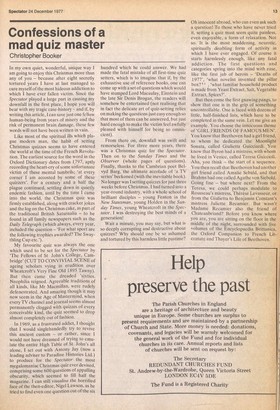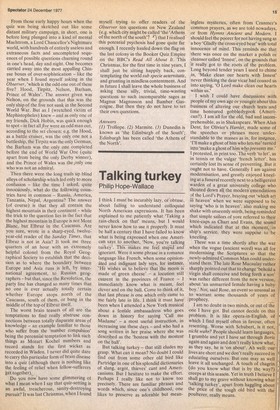Confessions of a mad quiz master
Christopher Booker
In my own quiet, wonderful, unique way I am going to enjoy this Christmas more than any of you β because after eight secretly tortured years I have at last managed to cure 'myself of the most hideous addiction to which I have ever fallen victim. Since the Spectator played a large part in causing my downfall in the first place, I hope you will bear with my tragic case-history β and if, by writing this article, I can save just one fellow human-being from years of misery and the risk of permanent brain damage, these few words will not have been written in vain.
Like most of the spiritual ills which plague modern man, the habit of setting Christmas quizzes seems to have entered the world at the time of the French Revolution. The earliest source for the word in the Oxford Dictionary dates from 1797, aptly recording the heart-cry of some unfortunate victim of these mental tumbrils; 'at every corner I am accosted by some of these quizzers'. For a century and a half the plague continued, settling down in quietly endemic fashion, until by the time I came into the world, the Christmas quiz was firmly established, along with cracker jokes and the log on the Christmas cake, as part of the traditional British Saturnalia β to be found in all family newspapers such as the Daily Telegraph (which always, every year, included the question β 'For what sport are the following trophies awarded? The Swaythling Cup etc.').
My favourite quiz was always the one which used to be set for the Spectator by 'The Fellows of St John's College, Cambridge' (CUT TO CONVIVIAL SCENE of ageing scholars vying in erudition over Wheatcroft's Very Fine Old 1895 Tawny). But then came the dreaded 'sixties, Neophilia reigned. Agreeable traditions of all kinds, like Mr Macmillan, were rudely defenestrated. And amazing though it may now seem in the Age of Mastermind, when every TV channel and journal seems almost permanently clogged with quizzes of every conceivable kind, the quiz seemed to drop almost completely out of fashion.
In 1969, as a frustrated addict, I thought that I would singlehandedly try to revive this ancient custom β or rather, since I would not have dreamed of trying to emulate the entire High Table of St John's all alone, I set out with Antony Jay (now a leading adviser to Paradine Histories Ltd.) to produce for the Spectator the most megalomaniac Christmas quiz ever devised, comprising some 600 questions of appalling obscurity, which seemed to fill half the magazine. I can still visualise the horrified face of the then-editor, Nigel Lawson, as he tried to find even one question out of the six hundred which he could answer. We had made the fatal mistake of all first-time quiz setters, which is to imagine that if, by the exhaustive use of reference books, one can come up with a set of questions which would have stumped Lord Macaulay, Einstein and the late Sir Denis Brogan, the readers will somehow he entertained (not realising that in fact the delicate art of quiz-setting relies on making the questions just easy enough so that most of them can be answered, but just hard enough to make the victim feel awfully pleased with himself for being so omniscient).
From, there on, downfall was swift and remorseless. For three more years, there was a Christmas quiz for the Spectator. Then on to the Sunday Times and the Observer (whole pages of questions). Finally, thanks to the Cumbrian poet Belvyd Barg,' the ultimate accolade of 'a TV series' beckoned (with the inevitable book). No longer was I setting quizzes for just three weeks before Christmas. I had turned into a year-round industry, with a whole school of brilliant disciples β young Fenton in the New Statesman, young Holden in the Sunday Times, young Wheatcroft in the Spectator. I was destroying the best minds of a generation!
Wait a minute, you may say, but what is so deeply corrupting and destructive about quizzes? Why should one be so ashamed and tortured by this harmless little pastime? Oh innocent abroad, who can even ask such a question! To those who have never tried it, setting a quiz must seem quite painless, . even enjoyable, a form of relaxation. Not so. It is the most maddening, neurotic, spiritually disabling form of activity in which I have ever engaged. Of course it starts harmlessly enough, like any fatal addiction. The first questions and categories spring into the mind with ease, like the first jab of heroin β 'Deaths of 1977', 'what novelist invented the pillar box?" , 'what familiar household product is made from Yeast Extract, Salt, Vegetable Extract, Spices?'.
But then come the first gnawing pangs, to show that one is in the grip of something uncontrollable. One is faced with dozens of little, half-finished lists, which have to be completed in the same vein. Let me give an example. You choose the innocuous theme of 'GIRL FRIENDS OF FAMOUS MEN', You know that Beethoven had a girl friend, to whom he dedicated the Moonlight Sonata, called Giulietta Guicciardi..You know that Byron had a mistress, with whom he lived in Venice, called Teresa Guiccioli. Aha, you think β the start of a sequence. You then recall that Beethoven had another girl friend called Amalie Sebald, and that Brahms had one called Agathe von Siebold. Going fine β but where next? From the Teresa, we could perhaps modulate to Rousseau's mistress, Therese Levasseur, or from the Giulietta to Benjamin Constant's mistress Juliette Recamier. But wasn't Madame Recamier also the friend of Chateaubriand? Before you know where you are, you are sitting on the floor in the middle of the night, surrounded with five volumes of the Encyclopaedia Brittanica, the Oxford Companion to French Literature and Thayer's Life of Beethoven. From those early happy hours when the quiz was being sketched out like some distant military campaign, in short, one is before long plunged into a kind of mental Maelstrom, a Lord Chancellor's Nightmare world, with hundreds of entirely useless and extraneous facts and uncompleted sequences of possible questions churning round in one's head, day and night. One becomes carried away into the most appalling Chinese boxes of over-sophistication β like the year when I found myself asking in the Observer, 'which is the odd one out of these five? Hood, Tirpitz, Nelson, Barham, Prince of Wales'. The answer given was Nelson, on the grounds that this was the only ship of the five not sunk in the Second World War. But as I (wretched victim of Mephistopheles) knew β and as only one of my friends, Dick Hobin, was quick enough to spotβin fact allfive were an odd man out, according to the set chosen: e.g. the Hood, as a battle cruiser, was the only one not a battleship, the Tirpitz was the only German, the Barham was the only one completed betbre the end of World War One (quite apart from being the only Derby winner), and the Prince of Wales was the .only one who was not an admiral.
Then there were the long trails up blind alleys of scholarship which led only to more confusion β like the time I asked, quite innocuously, what do the following countries have in common β Russia, America, Tanzania, Nepal, Argentina? The answer (of course) is that they all contain the highest mountain in their continent β while the trick to the question lies in the fact that the highest mountain in Europe is not Mont Blanc, but Elbruz in the Caucasus. Are you sure, wrote in a sharp-eyed, twelveyear-old reader of the Sunday Times, that Elbruz is not in Asia? It took me three quarters of an hour with an extremely helpful colonel from the Royal Geographical Society to establish that the decision as to where the boundary between Europe and Asia runs is left, by international agreement, to Russian geographers β but that, since the Revolution, the party line has changed so many times that no one is ever actually totally certain whether Europe stops north of the Caucasus, south of them, or bang in the middle of the top of Elbruz itself. The worst brain teasers of all are the temptations to find really abstruse connections between totally disparate areas of knowledge β an example familiar to those who suffer from the 'number compulsion' being the perennial temptation to link such things as Mozart Kochel numbers and record stands for the first wicket as recorded in Wisden. I never did quite dare to carry this particular form of brain disease into a quiz (although there is nothing like the feeling of relief when fellow-sufferers get together).., Do you now have some glimmering of what I mean when I say that quiz-setting is an awful, treacherous, sanity-destroying pursuit? It was last Christmas, when I found myself trying to offer readers of the Observer ten questions on New Zealand (e.g. which city might be called 'the 'Athens of the north of the south'? 3β) that I realised' this potential psychosis had gone quite far enough. I recently hauled down the flag on the last colony in the Booker Quiz Empire on the BBC's Read All About It. This Christmas, for the first time in nine years,! shall just be sitting happily back, contemplating the world sub specie aeternitatis, and grunting in mindless contentment. And in future I shall leave the whole business of asking these silly, trivial, time-wasting questions to such incomparable sages as Magnus Magnusson and Bamber Gascoigne. But then they do not have to set their own questions.
Answers (1) Trollope. (2) Marmite. (3) Dunedin is known as 'the Edinburgh of the South'; Edinburgh has been called 'the Athens of the North'.











































 Previous page
Previous page